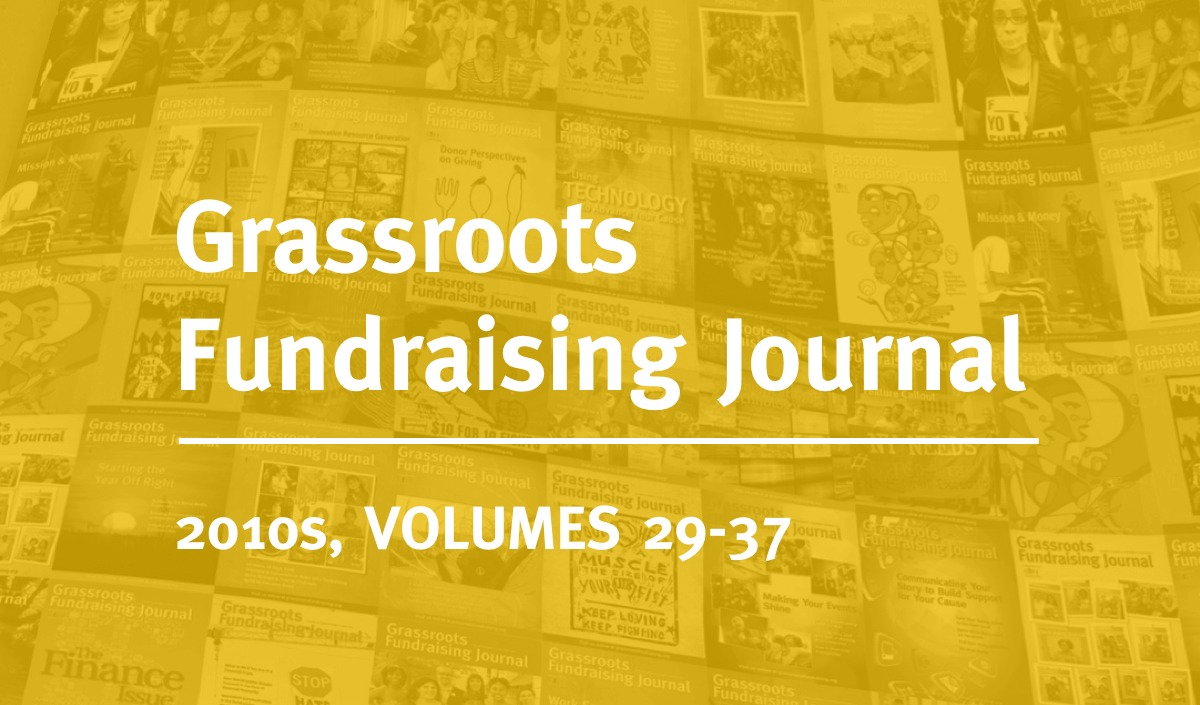
Editors’ note: This article, first published in print during Jan/Feb 2012, has been republished for Nonprofit Quarterly with minor updates.
A FEW YEARS AGO I was facilitating a fundraising workshop with a group of community arts organizations when one of the participants, a person of color, asked whether it was better to hire a white person than a person of color as a development director. The implication was that people with big money were white, so wouldn’t it be best to have a white person as a fundraiser if you wanted to raise big dollars.
My first thought was: Wow, what year is this? Do people still think like this? As we began to probe the question of what it’s like raising money as people of color, a couple of questions kept coming up: Why aren’t there more seasoned development folks of color? How can smaller, neighborhood-based, ethnic centered arts organizations attract those who do exist?
Growing your Own
As is the case with just about every other profession in the United States, fundraisers are overwhelmingly white. The Association of Fundraising Professionals, the professional association of individuals and organizations that generate philanthropic support for a wide variety of charitable institutions, counts only 11 percent of its more than 31,000 members as people of color.
This we have a crisis and an opportunity. People of color run organizations need fundraisers of color in order to raise money more effectively in the communities in which we work, and to legitimize the fundraising profession in the eyes of our program and admin-oriented colleagues. When people of color take on fundraising responsibilities, other staff of color is more likely to participate in fundraising activities, thus increasing the overall effectiveness of the organization’s fundraising efforts. They may even see themselves in that role, thereby increasing the number of fundraisers of color in the profession.
Unfortunately, organizations that are staffed mainly by white people are also competing for the few fundraisers of color, as they reach to attract, cultivate, and steward donors of color. That’s the crisis.
The opportunity? Organizations based in communities of color can serve as training grounds for future fundraisers of color. What if we grew our own fundraisers of color from our non-fundraising staff board members, and volunteers? The first question that springs up is one of skills: just what are the skills and qualities that a development person needs to succeed? Here are ones I consider essential for any fundraiser:
For fundraising to be effective in our communities we have to be creative and responsive to how things are done in a given community, and not make assumptions about either what a donor looks like or how they are supposed to act
- Passion for the mission. Effective fundraisers must be passionate about the organization’s mission; often, shortcomings in the other skill areas can be overcome with enough belief and commitment driving the person to develop the skills he or she will need to be effective in the job.
- Good communication skills—both verbal and written. Fundraisers do not have to be great orators or riveting public speakers; rather, they should have really good listening skills and be able to stay on message when presenting the case for support or talking about the organization and its mission. Even if grant writing is not one of the areas of responsibility for a particular fundraising staff position, writing skills are required for fundraising appeals, newsletters, online content, thank you notes, and regular communication with donors.
- An open mind. To be successful in grassroots fundraising, you must be open to new people and ideas and ways of doing things. For fundraising to be effective in our communities we have to be creative and responsive to how things are done in a given community, and not make assumptions about either what a donor looks like or how they are supposed to act. Other skills and knowledge about specific fundraising strategies—including direct mail, special events, major donor campaigns, and online giving— can be acquired and/or polished through classes and workshops, good supervision and support, and most important, with practice.
People can also work into a fundraising position. I recently worked with a small advocacy organization that was participating in the Fundraising Academy for Communities of Color, an eight month intensive training and coaching program co-sponsored by GIFT and Compass Point Nonprofit Services. The development director of this small advocacy group was the primary attendee for the Academy, but one of the program staff people began attending as well because she was interested in getting
more involved in the organization’s fundraising efforts. Thinks to the learning she did at the Academy, the program person began taking on more development tasks. When the development director left her position after the Academy ended, the program staffer was hired to fill it.
Here’s a word of caution, however. In that same training program, another organization transferred one of their program staff into a fundraising support role. Her hard skills were very good—she was an effective writer, researcher, and project manager. However, she lacked people skills and was not comfortable meeting with donors, preferring to stay with more “behind the-scenes” activities such as research and writing. Ultimately, she stagnated in her development as a fundraiser. This might have been prevented if the organization had been clear about its needs and the requisite skills to fill them.
Finders Keepers?
What if you are able to find someone on your staff whom you are able to develop into a very good fundraiser for your organization? Can you afford to keep them and compete with larger (often white) organizations that can pay higher salaries and provide more benefits?
Sign up for our free newsletters
Subscribe to NPQ's newsletters to have our top stories delivered directly to your inbox.
By signing up, you agree to our privacy policy and terms of use, and to receive messages from NPQ and our partners.
You can if you provide them with opportunities for professional development and growth—both in honing their fund development skills and through mentoring, coaching and role modeling.
In the San Francisco Bay Area we are blessed to have programs like the Multicultural Alliance (MCA), a professional development and networking program of the local chapter of the Association of Fundraising Professionals that serves people of color and LGBT fundraisers.
MCA provides monthly educational opportunities, training workshops, timely discussions, and access to other professional development and networking opportunities that enable program participants to hone their essential fund development skills. They help break down the isolation that many fundraisers of color (and LGBT fundraisers) feel as minorities in an otherwise extremely diverse nonprofit sector in the Bay Area.
Check out your local AFP chapter for a mentorship program; although it may not be specifically oriented toward people of color, it can nevertheless provide an important opportunity for development folks to support each other through peer learning.
GIFT is also an important source for trainings, materials, and its biennial conference that brings together the most diverse group of people of color fundraisers in the country to learn from and support each other in gaining new skills and knowledge.
Professionalization of the Sector: another Source?
I find it interesting that more and more development people of color have gone for advanced degrees, such as a master’s degree in nonprofit management, to give them a leg up in advancing their careers. These next-generation fundraisers of color have chosen development as a career path and see themselves as future leaders in philanthropy. This is a welcome shot in the arm for diversity in the field.
Typically, these new fundraisers have not only purposely chosen the profession but also the organizations they choose to work with based on a combination of fi, mission, and organizational culture and values that are in sync with theirs.
I’ve met a few fundraisers who actually identified the organization they wanted to work for and actively sought a fundraising position there. In all of these cases the organization had a need for fundraising help and was only too happy to create or fill an existing development position to take advantage of the opportunity presented to them.
What else can you Do?
Although I don’t suggest holding out for some up-and-coming fundraiser of color to come knocking on your door looking for a job, there are a few things you can do to make your organization attractive to fundraisers of color and to make it easier to develop good fundraisers from existing staff or volunteers.
- Look at your hiring practices. What are the patterns that you notice? I’ve worked with organizations that lament their lack of diversity in staffer with no insight into the barriers their hiring practices present. One organization I worked with didn’t realize that it was a barrier to require a bachelor’s degree for all of their jobs, including the administrative ones. Further, they hadn’t noticed that everyone on staff had attended a liberal arts college on the East Coast, which may reveal an underlying bias in who they’re willing to consider hiring.
- Be clear about your expectations of your fundraising staff It’s important to make clear that fundraising requires a team effort of everyone in the organization, and that one lone staff person cannot do it all. Most situations where a fundraiser doesn’t last in their position are the result of a disconnect between what the organization expected and what the fundraiser understood their job to be.
- Check your assumptions about what kind of person is a good fundraiser. Part of having consistent expectations of each other is developing clarity and understanding of the organization’s values and attitudes toward money and fundraising and its assumptions about what charitable support looks like.
The bottom line is this: fundraising is a program just like other direct-service or client-centered programs. It should be treated as such when looking for staffer and deciding the essential skills and attributes needed for its particular purposes.
Organizations based in communities of color have historically been creative in hiring staff and figuring out how to deliver on their mission; fundraising, despite its focus on money and outside support, should be no exception.




